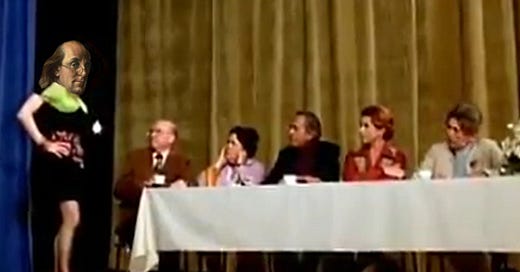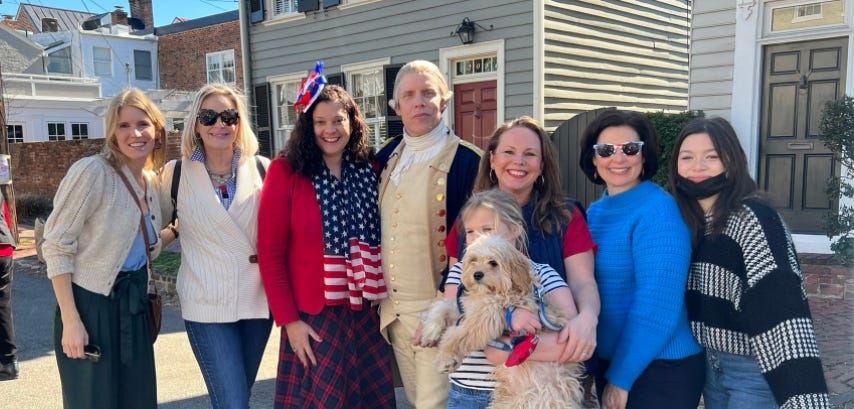I was reading some Benjamin Franklin recently, and I came across a passage on hypocrisy that reminded me of the following situation: while the evidence for mask wearing as a mitigation measure to reduce the spread of COVID in schools is weak to nonexistent, some public officials, including those on school boards, seem to be treating the need for all kids to wear masks in school as a religious tenet, just as other religions require the wearing of veils, and even full-body burqas. With some people now talking about the need for kids to wear the more restrictive N95-style face mask, perhaps a burqa-esque, full-body covering for kids will be next. Yet even as some officials are imposing mask wearing on others with religious fervor, their own mask wearing practices are lax.
The passage from Benjamin Franklin I read was printed in The New-England Courant on July 23, 1722, under his familiar pseudonym Silence Dogood. In it, Franklin writes:
It has been for some Time a Question with me, Whether a Commonwealth suffers more by hypocritical Pretenders to Religion, or by the openly Profane? But some late Thoughts of this Nature, have inclined me to think, that the Hypocrite is the most dangerous Person of the Two, especially if he sustains a Post in the Government, and we consider his Conduct as it regards the Publick … [A] publick Hypocrite every day deceives his betters, and makes them the Ignorant Trumpeters of his supposed Godliness: They take him for a Saint, and pass him for one, without considering that they are (as it were) the Instruments of publick Mischief.
He concludes with the quote: “we must judge of Men by the whole of their Conduct, and the Effects of it. Thorough Honesty requires great and long Proof, since many a Man, long thought honest, has at length proved a Knave. And it is from judging without Proof, or false Proof, that Mankind continue Unhappy.”
That got me to thinking kids might be interested in the following school project on the subject of local government. Ask your school board members if they will share with you their planned lunches or dinners at public places, or other plans to be at public venues, for the coming week. Let them know you plan to make a surprise visit to one or more of those places to observe whether or not they’re adhering to the same mask rules they support imposing on kids at school. You won’t disturb them, but rather quietly take careful notes on their mask use. Are they keeping them off inside, even when they’re not actively drinking or chewing? Are they wearing their masks properly, or leaving them under their noses or chins? Kids at our school even have to wear masks outside. Are the school board members wearing their masks outside? Those sorts of observation.
School employees regularly enforce school mask rules on kids. But who else is “watching the watchers” as they say? If it turns out all school board members are consistently following the same mask rules they impose on kids, then kids will know they’re at least not the sort of hypocrites Franklin feared most (even if they remain wrong on the science) and the kids will have done their part in enforcing rules the school board members themselves claim are important to public health. But if it turns out school board members are acting hypocritically, it will be a lesson for kids on the inconsistency of reasoning -- and reinforce a civics lesson Ben Franklin gave some three hundred years ago.
Regarding debates on the efficacy of mask policies generally, Franklin offers some further advice. In a letter to the Pennsylvania Gazette on March 27, 1735, he writes of exactly the sort of tendency toward conformity in opinion at the expense of truth I wrote about in a previous essay. Says Franklin:
Prevailing Opinions insensibly gain the Possession of our Minds, and have commonly the Advantage of being Firstcomers: and yet are very often no better than prevailing Falshoods, directly the Reverse of Truth. We are all apt to be misled, where the Safety of our Interest, or Peace with our Neighbours appear to depend upon a particular Sett of Principles, or upon falling in with a Party. A Man can hardly forbear wishing those Things to be true and right, which he apprehends would be for his Conveniency to find so: And many Perswasions, when they are looked into, plainly appear to have no better a Foundation.
Franklin’s openness to the lessons of new information was one of the keys to his success as a learner, and he himself admitted to having fallen prey to the dynamic psychologists today call the “cognitive bias” of “motivated reasoning.” James Madison recorded a speech Franklin delivered to the Constitutional Convention that summarized his thoughts on the subject. In it, Franklin says
[T]hough many private persons think almost as highly of their own infallibility as of that of their sect, few express it so naturally as a certain French lady, who in a dispute with her sister, said “I don’t know how it happens, Sister but I meet with no body but myself, that’s always in the right.”
In contrast, Franklin states his own opinion as follows:
[H]aving lived long, I have experienced many instances of being obliged by better information or fuller consideration, to change opinions even on important subjects, which I once thought right, but found to be otherwise.
And to take a more specific example, earlier in his life Franklin espoused racist views, but later in life he publicly noted his change of opinion based on his own observations of the performance of black students at schools, including schools he helped found himself. Franklin wrote, “from what I then saw, [I] have conceiv’d a higher Opinion of the natural Capacities of the black Race, than I had ever before entertained. Their Apprehension seems as quick, their Memory as strong, and their Docility in every Respect equal to that of white Children. You will wonder perhaps that I should ever doubt it, and I will not undertake to justify all my Prejudices, nor to account for them.”
Today, required mask-wearing by kids isn’t the only, or the biggest, barrier to learning, but it’s certainly a barrier. Given Franklin’s first-hand experience with the capacity of kids to learn regardless of race, he would surely be gravely disappointed if he could see the 2020-2021 Standards of Learning test results for schools where I live in the City of Alexandria, Virginia, which show dramatic learning gaps among kids grouped by race:
Where I live, it's getting hard for people to ignore the vast chasm between mask policies imposed by local politics (based on uniform one-party rule) and how average people are living their lives. On Sunday, I went to a concert with my wife and kids, and, besides us, the place was filled with elderly people, all unmasked, full of joy, sitting at tightly packed tables, conversing freely and even dancing with each other. They were all vaccinated, but even so they’re still in a higher risk group than children. To be precise about the risks, even before vaccines were available, Cathrine Axfors and John Ioannidis of Stanford calculated that the risk of death for children and adolescents who were infected with COVID was 0.001 percent — that is, one in every 100,000 infected. The risk today is much lower due to better treatments. Using data from the Centers for Disease Control, about 300 Covid deaths annually among the nearly 60 million American children aged 5 to 18 means the risk of dying from Covid is one in 200,000. That is, a child is more likely to be killed in a car accident, commit suicide, be murdered, drown, or be accidentally poisoned. Regarding the elderly, a study by researchers at the National Institutes of Health and published by the Centers for Disease Control, which tracked more than 1 million vaccinated adults in America over most of 2021, showed that among vaccinated people over 65 without an underlying medical condition, only one person died, that there were only 36 deaths overall, mostly among older people with a multitude of comorbidities, and that among everyone else studied there were just eight deaths among more than 1.2 million people, making their risk of dying about 1 in 150,000, which are about the same odds that in any given year they would die in a fire or from falling down stairs.
Back to the concert hall packed with maskless, joyful, elderly people. The scene was a stark contrast to the kids who would all have to go to school the next day wearing masks, even outside, and who won’t be allowed to talk while they eat.
The concert we went to see was the great Daryl Davis’ annual tribute to musicians and songwriters who died the previous year. This year, one of the songs the band played was “Harper Valley PTA,” as songwriter Tom Hall passed away in 2021. The song’s about a mother who gets a note from the Harper Valley Parent-Teacher Association accusing her of being a poor role model for her daughter. The mother storms down to that night’s PTA meeting and points out to the audience all the particular ways the PTA members are themselves poor role models for various reasons, with the lyrics closing with “You think that as the mother I’m not fit, well … you’re all Harper Valley hypocrites.”
Hopefully, your school board isn’t in Harper Valley. But if it is, and school board members keep refusing to let parents make reasonable decisions about their kids’ mask wearing practices, perhaps it’s time for some light to shine down in the Valley.
UPDATE: At our local George Washington Birthday Parade in Alexandria, Virginia, some of our school board members walked in the parade, without masks. If they had been in this same posture outside on school grounds, they would have been in violation of the mask mandate rules they voted to apply to all kids at public schools.







